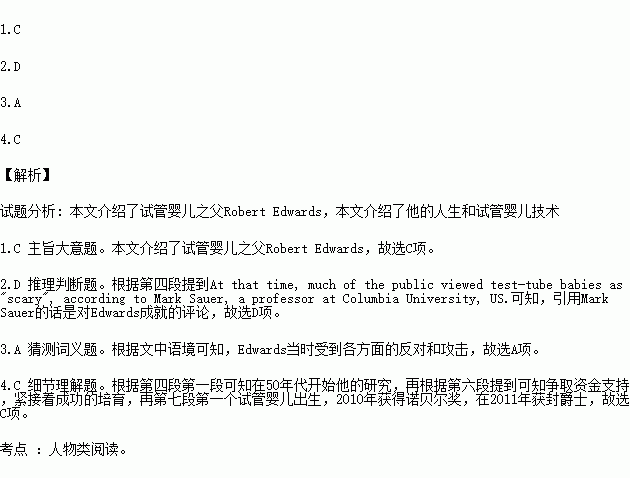题目内容
What's the most important thing in life?
People's answers vary greatly. For British scientist Robert Edwards, the answer is having a child. "Nothing is more special than a child," he told the BBC.
Edwards, the inventor of the In Vitro Fertilization (IVF) technology—more commonly known as "test-tube (试管) baby" technology—passed away on April 10, 2013 at the age of 87.
"Edwards changed the lives of millions of ordinary people who now rejoice (高兴) in the gift of their own child," said Peter Braude, a professor at King's College London. "He leaves the world a much better place."
Edwards started his experiments as early as the 1950s, when he had just finished his PhD in genetics. At that time, much of the public viewed test-tube babies as "scary", according to Mark Sauer, a professor at Columbia University, US.
Edwards and his colleague Patrick Steptoe faced opposition from churches, governments and media, not to mention attacks from many of their fellow scientists. "People said that we should not play God and we should not interfere with nature," Edwards once told Times. He said that he felt "quite alone" at the time.
"But Edwards was a fighter, and he believed in what he was doing," said Sauer. Without support from the government, the two struggled to raise funds to carry on. And in 1968 they finally developed a method to successfully fertilize human eggs outside the body.
The first test-tube baby was born on July 25, 1978. Her name was Is Louise Brown. Despite people's safety concerns, Brown was just as healthy as other children.
"IVF had moved from vision to reality and a new era in medicine had begun," BBC commented.
Ever since then, public opinion has evolved considerably. Couples who were unable to have babies began thronging (拥向) to Edwards' clinic. Nowadays, Reuters reports, some 4.3 million other "test-tube" children exist. Edwards received a Nobel Prize in 2010 and was knighted (封为爵士) by Queen Elizabeth in the following year.
Before his death, Edwards was still in touch with Louise. "He is like a grand dad to me," she said in an interview with the Daily Mail.
He is a granddad to millions, in fact.
1.What’s the article mainly about?
A. The first test-tube baby.
B. A new era in medicine.
C. The inventor of IVF technology.
D. The changes IVF technology has brought.
2. The writer quoted Peter Braude to ________.
A. show how difficult it was for Edwards to do his work
B. describe what kind of person Edwards was
C. explain why he is loved by all children
D. comment on his achievement
3.The underlined word "opposition" in Paragraph 6 is closest in meaning to "________"
A. attackB. supportC. testD. influence
4.What is the correct order of events in Edwards' life?
a. He received a Nobel Prize.
b. He struggled to raise funds.
c. The first test-tube baby was born.
d. He was knighted by Queen Elizabeth II.
e. He succeeded in fertilizing human eggs outside body.
f. He started his experiments on IVF technology.
A. f-e-b-c-a- d B. f-b-e-c-d-a C. f-b-e-c-a-d D. f-e-d-a-c-b
 海淀黄冈名师导航系列答案
海淀黄冈名师导航系列答案
